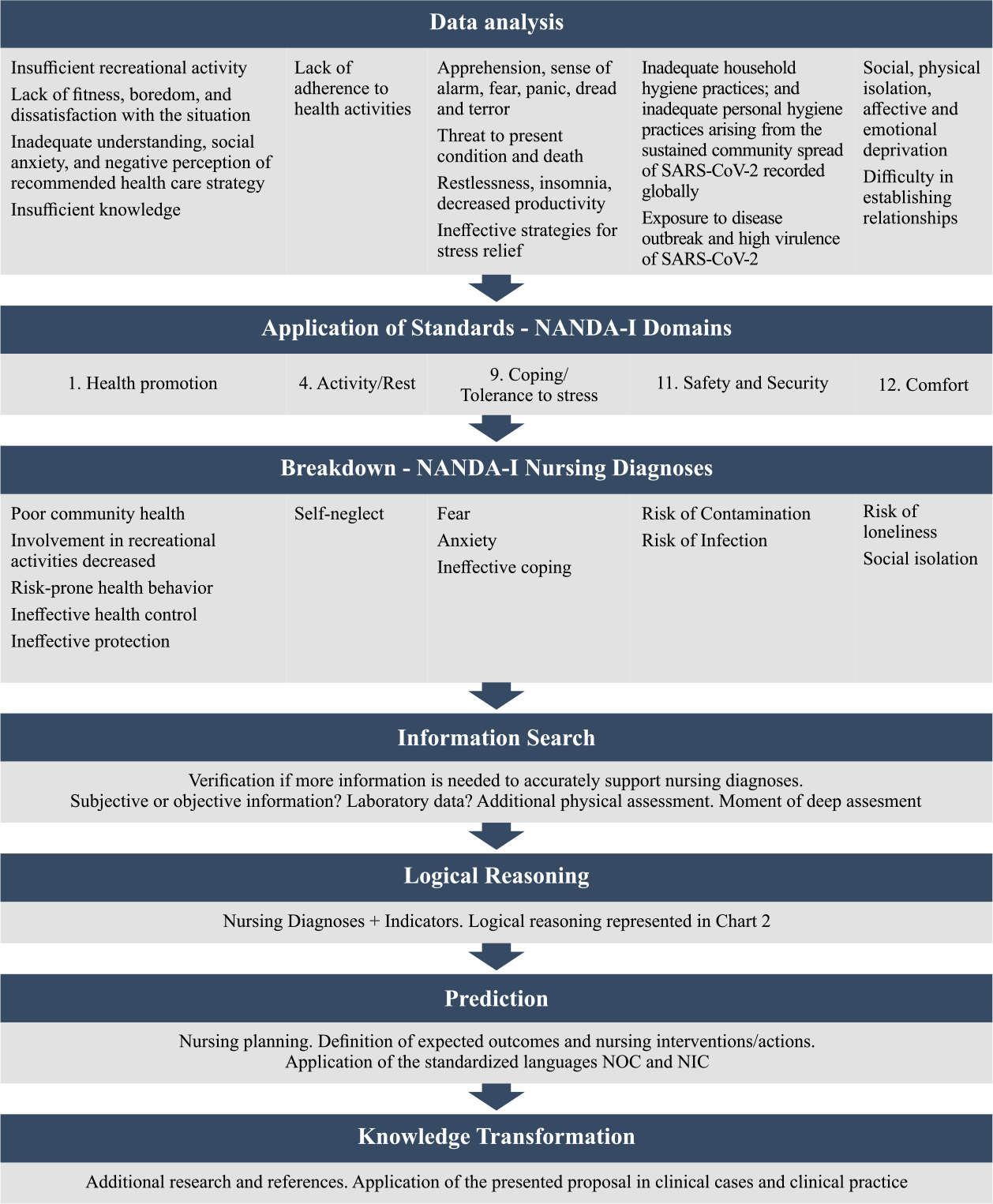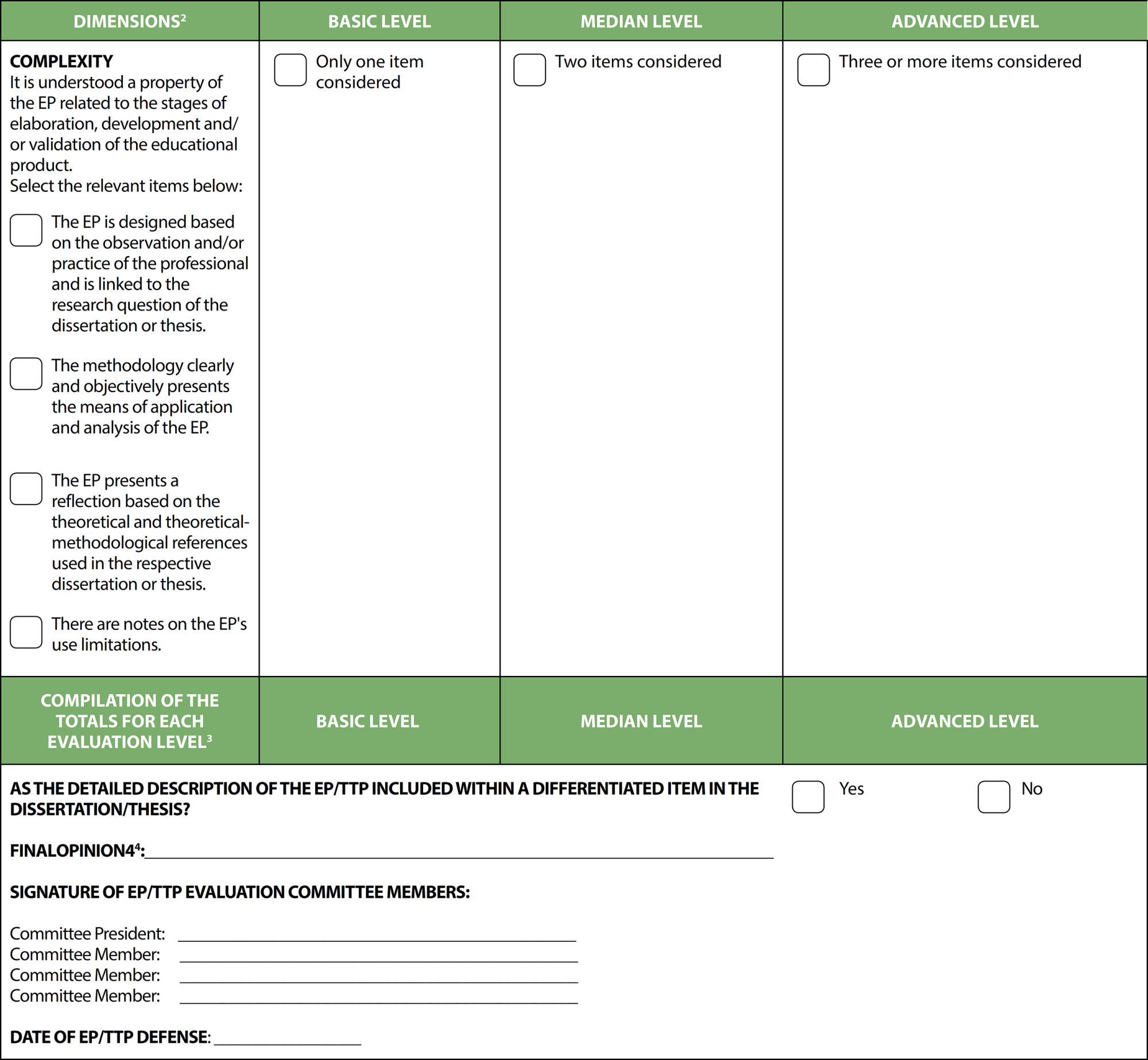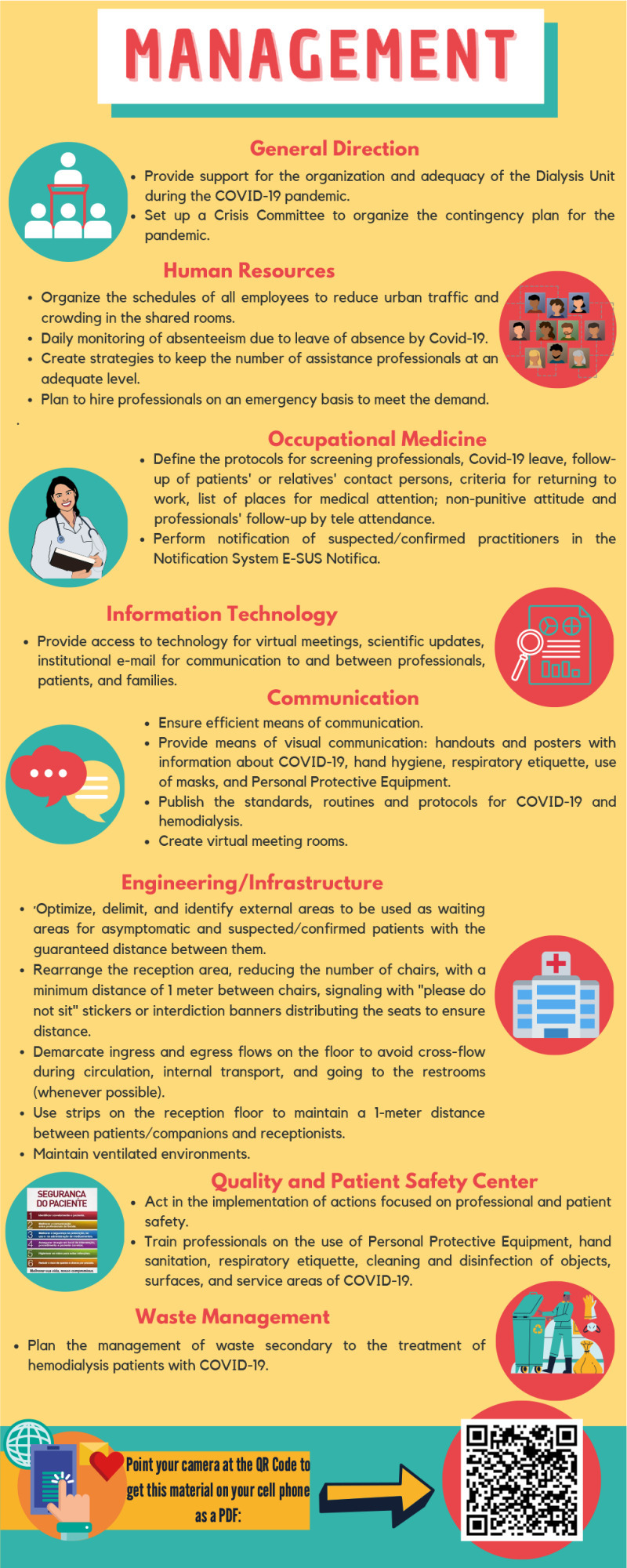-
REFLECTION02-25-2022
Nursing diagnosis related to the coronavirus pandemic infections in the Brazilian population
Revista Brasileira de Enfermagem. 2022;75:e20200573
Abstract
REFLECTIONNursing diagnosis related to the coronavirus pandemic infections in the Brazilian population
Revista Brasileira de Enfermagem. 2022;75:e20200573
DOI 10.1590/0034-7167-2020-0573
Views0See moreABSTRACT
Objective:
To reflect on the nursing diagnoses in individuals, families or collectivity facing the pandemic of COVID-19.
Methods:
The Developing Nurses’ Thinking model was considered as a theoretical framework, and the phases of critical thinking skills were applied to the identification of nursing diagnoses in the general population in the face of the pandemic.
Results:
The systematic application of the seven critical thinking skills of the proposed model and the presentation of 13 nursing diagnoses and their respective indicators were performed.
Final considerations:
It is necessary to recognize the importance of incorporating nursing diagnoses and clinical reasoning in all contexts of professional nursing care. Further discussion on the subject is also necessary, with the aim of validating the suggested nursing diagnoses, as well as their indicators, in more in-depth studies of experience reports and clinical cases.

-
REFLECTION10-18-2022
The act of playing as a signifier for the application of the dramatic Therapeutic Toy performed by the nurse: theoretical reflection
Revista Brasileira de Enfermagem. 2022;75(2):e20210062
Abstract
REFLECTIONThe act of playing as a signifier for the application of the dramatic Therapeutic Toy performed by the nurse: theoretical reflection
Revista Brasileira de Enfermagem. 2022;75(2):e20210062
DOI 10.1590/0034-7167-2021-0062
Views0See moreABSTRACT
Objective:
To reflect on the possible contributions of the act of playing as a signifier in the use of dramatic Therapeutic Toy performed by the nurse.
Methods:
Theoretical-reflexive study, based on three moments: The language of the unconscious that emerges as a signifier when playing; How the dramatic Therapeutic Toy is used by the nurse; and the act of playing as a signifier during the application of the dramatic Therapeutic Toy: contributions to nursing practice.
Results:
Through the intervention of the nurse in the sessions, the act of playing mediated by the dramatic Therapeutic Toy provides the child with the opportunity to elaborate on signifier elements that had not been meant by him.
Final considerations:
Through the dramatic Therapeutic Toy, the articulation of the child's organism with his reality in the formation of the self constitutes an advance for the production of knowledge and nursing assistance to the child, enabling complete care and allowing the elaboration of their anxieties, which collaborates so that the child constitutes himself as a subject.
-
REFLECTION10-18-2022
Improvement of Educational Products Validation form in professional postgraduate programs
Revista Brasileira de Enfermagem. 2022;75(2):e20210063
Abstract
REFLECTIONImprovement of Educational Products Validation form in professional postgraduate programs
Revista Brasileira de Enfermagem. 2022;75(2):e20210063
DOI 10.1590/0034-7167-2021-0063
Views0See moreABSTRACT
Educational Product and Technical-Technological Product constitute a specificity of postgraduate programs in the professional modality, a product that must be carefully evaluated by the programs and recorded on platforms of evaluating bodies. In 2019, a working group from the teaching area was assembled to create a Validation Form for these products. Thus, this article aims to present a proposal for improving this Validation Form for Educational/Technical-Technological Products, based on reflections treated in scientific articles and scientific events from the area, focusing on the relevance and need for this type of evaluation in a standardized way. It is intended to collaborate with the improvement of the evaluation processes and procedures of Educational/Technical-Technological Products for the necessary accuracy, representativeness, and homogeneity, which will allow the real dimensioning of the contributions of these products. This involves not only training qualified professionals, but also transforming practices in the Sistema Único de Saúde (SUS) [Brazil's Unified Health System], promoting advances in science and in its fields of application.

-
REFLECTION09-29-2022
Health care of deaf persons during coronavirus pandemics
Revista Brasileira de Enfermagem. 2022;75:e20201036
Abstract
REFLECTIONHealth care of deaf persons during coronavirus pandemics
Revista Brasileira de Enfermagem. 2022;75:e20201036
DOI 10.1590/0034-7167-2020-1036
Views0See moreABSTRACT
Objective:
To reflect about the barriers experienced by the deaf population during the COVID-19 pandemic, the proposals to overcome communication barriers in health care and the role of public policies in effecting the social inclusion of deaf people.
Methods:
Reflection based on studies on health care for deaf people, the COVID-19 pandemic and public accessibility policies.
Results:
The global crisis of COVID-19 has deepened pre-existing inequalities in the world, in addition to highlighting the vulnerability of people with disabilities, including deaf. Government, institutional and social initiatives to mitigate difficulties in communicating to deaf people have been made, but they are still insufficient to guarantee protection for them in this pandemic and full inclusion in health care.
Final considerations:
Social inclusion, supported by law, and the linguistic accessibility of deaf people still need to generate broad and concrete actions so that deaf people can enjoy their rights as citizens.
-
REFLECTION09-29-2022
Hemodialysis in the context of COVID-19: care, nursing protagonism and quality
Revista Brasileira de Enfermagem. 2022;75:e20201077
Abstract
REFLECTIONHemodialysis in the context of COVID-19: care, nursing protagonism and quality
Revista Brasileira de Enfermagem. 2022;75:e20201077
DOI 10.1590/0034-7167-2020-1077
Views0See moreABSTRACT
Objective:
To reflect on the need to reorganize satellite dialysis units to ensure the safety of patients and workers, focusing on minimizing the risk of contamination by SARS-CoV-2.
Methods:
Reflection considering the guidelines of international and Brazilian institutions and scientific articles, with a view to possible adaptations to the Brazilian reality.
Results:
The actions suggested and adapted by Dialysis Units from different countries during the pandemic focus on the quality of care and safety of the patient and workers. There was an opportunity to reflect on these actions using the Donabedian Model for quality of care and highlight the nursing team’s role in this context.
Final considerations:
The focus on quality and safety related to institutionalized processes and the assessment through indicators can contribute to the management of the outpatient dialysis unit in the context of COVID 19.

-
REFLECTION07-23-2021
Pediatric Intensive Care Unit: reflection in the light of Florence Nightingale’s Environmental Theory
Revista Brasileira de Enfermagem. 2021;74(5):e20201267
Abstract
REFLECTIONPediatric Intensive Care Unit: reflection in the light of Florence Nightingale’s Environmental Theory
Revista Brasileira de Enfermagem. 2021;74(5):e20201267
DOI 10.1590/0034-7167-2020-1267
Views0See moreABSTRACT
Objective:
To reflect on the environment of the Pediatric Intensive Care Unit in the light of the Florence Nightingale’s Environmental Theory.
Methods:
A theoretical-reflexive essay of constructs originated from the final work of a discipline related to the Florence Nightingale’s Environmental Theory and the current legislation regarding the environment of the unit.
Results:
The elements “lighting,” “noise,” “colors, and varieties of objects,” “location of nursing units,” and “odors” follow Florence Nightingale’s assumptions while the elements “ventilation,” “spacing between beds,” “furniture” underwent adaptations to suit the current structure of the unit.
Final considerations:
The environmental theory is a milestone in the history of nursing. Despite the transformations, such as the emergence of intensive care units and the permanence of the family in these units, the nursing team must maintain Florence Nightingale’s concern about the environment influencing the health/disease process and promoting an adequate environment for the care of the child and his family.
-
REFLECTION07-19-2021
Social control and nursing performance in defense of life in the COVID-19 pandemic
Revista Brasileira de Enfermagem. 2021;74:e20201310
Abstract
REFLECTIONSocial control and nursing performance in defense of life in the COVID-19 pandemic
Revista Brasileira de Enfermagem. 2021;74:e20201310
DOI 10.1590/0034-7167-2020-1310
Views0See moreABSTRACT
Objective:
to reflect on social control in health and the contributions that nursing can make to cope with the COVID-19 pandemic.
Methods:
this is a theoretical reflection, elaborated from discussions based on literature and the experience of authors’ performance in social control and in Primary Care. It is divided into two topics: the first, related to aspects of institutionalized social control; the second, related to the perspectives for nursing in this space.
Results:
limits and relevant aspects for nurses’ role in social control are presented, contributing to a perspective of praxis in health based on their ethical-political commitment and their technical competence in the coordination and management of care to face the pandemic.
Final considerations:
nurses’ role in social control favors the strengthening of the struggle for the right to life above profits, especially through popular participation in the community context in Primary Care.
-
REFLECTION07-12-2021
Coronavirus infection and nursing care for children and adolescents with cancer
Revista Brasileira de Enfermagem. 2021;74:e20201049
Abstract
REFLECTIONCoronavirus infection and nursing care for children and adolescents with cancer
Revista Brasileira de Enfermagem. 2021;74:e20201049
DOI 10.1590/0034-7167-2020-1049
Views0See moreABSTRACT
Objective:
Reflect on the implications of COVID-19 for the nursing care of pediatric oncology patients.
Methods:
Theoretical and reflective essay, based on recent scientific publications and expert recommendations on the care of pediatric patients under cancer treatment in the context of the current pandemic.
Results:
Reflected on the involvement of the pediatric population in general by COVID-19, the vulnerability of pediatric oncology patients to the complications of the disease and the likely challenges for their care. The pandemic demanded a rapid adaptation of health services in terms of patient care flow, care protocols, infection prevention measures, and redefinition of cancer therapy, with repercussions for professionals, patients, and their families.
Final considerations:
It is not yet known how often or how severely children with cancer have been affected by COVID-19, but therapeutic and care adaptations for the maintenance of these patients’ treatment in the pandemic context are noted.



